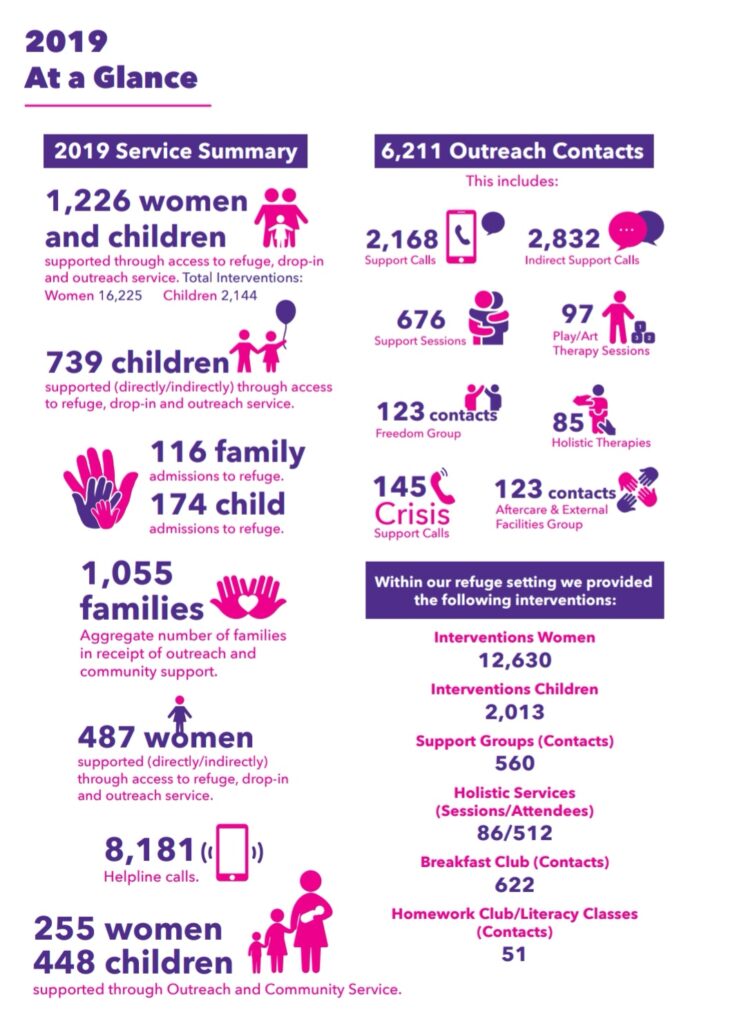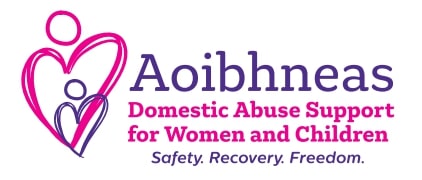Aoibhneas, the Dublin based domestic abuse support service for women and children, recently launched the organisation’s 2019 annual report. The report details the support offered to women and children affected by domestic abuse throughout 2019 and demonstrates the extent of the epidemic in Ireland, as just one of 39 services nationwide. A total of 1,226 women and children were supported in 2019, through access to refuge, drop-in and outreach service. In supporting those women and children, Aoibhneas provided 16,225 interventions to women and 2,144 interventions (i.e. play and art therapy, support groups, holistic services, homework club and literacy classes) to children within refuge setting. In addition, the helpline answered and worked through 8,181 calls.
In 2019, Aoibhneas provided support to 739 children across refuge and outreach, a 17% increase on the 2018 figure and which highlights the need for continued specialist support for children in a household where domestic abuse is taking place. Of that number, 38% of the children were between the ages of 6-12 and 34% were under 5 years of age. The wide-reaching nature of Aoibhneas’ work in 2019 also points to the diverse and often unconsidered nature of domestic abuse that occurs. 84% of women who presented disclosed some form of emotional abuse and 70% disclosed a form of physical abuse. Instances of financial abuse has risen 13% to 57% since 2018 and can entail being denied access to household finances for food, rent and household utilities. Digital abuse, a newer but growing mechanism through which control can be exerted, with cases disclosing including confiscating and searching through devices, was up 6% to 21% in 2019. 20% of women that presented, disclosed instances of sexual abuse.

49% of women Aoibhneas supported identified their perpetrator as a current spouse, partner, or boyfriend. 12% of women disclosed an ex-spouse as their abuser, and 26% of women said an ex-partner or boyfriend abused them. These figures suggest that intimate partner relationships represent the majority of cases whereby domestic abuse gets perpetuated. However, 9% of clients disclosed that their abuser was a male family member, while 4% identified a female family member as the abuser; this represents an increasing trend of adult child to parent violence. In recent years this has been a feature of the housing crisis whereby more adult children are remaining in or are returning to the family home. In addition to providing continuity of care for women and children throughout the year, 2019 also saw the launch of the organisations new brand and profile, the development of a volunteer programme and further improvement on the organisation’s governance structures.
It was evident from early on that the onset of the COVID-19 pandemic would have a devastating impact on women and children. Aoibhneas adapted quickly and made continuity of care to women and children a priority, along with the protection of staff and clients. When Government restrictions meant that the organisation could not operate the refuge at full capacity, Aoibhneas innovated and found additional accommodation to ensure the availability of a safe space for women and children. Thanks to the Young Women’s Christian Association (“YWCA”), and the support of TUSLA, the organisation was quickly able to make arrangements for additional accommodation units at the YWCA’s Baggott Street premises. With the growing demand for services during the lockdown, this additional space meant that Aoibhneas could support the increased numbers of women and children looking for help. During the 3-month period of occupation, Aoibhneas, through YWCA’s Baggot Street premises, accommodated 16 families, including 15 children. During the same period, a further 30 families, including 36 children, were accommodated through Aoibhneas Refuge centre in Coolock. A further 20 families received crisis support through Airbnb, HAP, and Private Rental accommodation.
Aoibhneas has seen a sharp rise in calls to its helpline and in the period from March to the end of August, Aoibhneas saw a 125% increase in calls to its Helpline.
Melanie Farrell, Chairperson of Aoibhneas commented: “2019 seems like a distant memory, and the world we are living in today has changed utterly. Undoubtedly, you will have seen the many news reports that documented the substantial increase in domestic abuse perpetrated against women during the lockdown. As restrictions increase once again from today, we know that home, which should be a place of safety, is anything but, for many and we remain available to those that need our help. At Aoibhneas, I am proud to say that we adapted quickly and did our best to provide continuity of care to women and children over the last seven months. When Government restrictions meant that we could not operate the refuge at full capacity, we innovated and found additional accommodation to ensure continuity of care. I have been blown away by the team’s dedication and professionalism in handling the crisis and their commitment to safeguarding women and children at all times. However, the pandemic only served to highlight both the importance and significant under-resourcing of the sector. I hope that events over the last few months are a catalyst for positive and meaningful change and can make a difference in how we support women and children living through domestic abuse across the country.”
Emma Reidy, CEO of Aoibhneas commented: “As we enter into level 5 restrictions and the country enters into another lockdown, I am reminded of the considerable demand we experienced for our service during the initial lockdown and how Aoibhneas has over the seven months adapted to meet the crisis needs of women and children. Our helpline over a 6-month period saw an average 125% increase in callers seeking help and support. While encouraged to see increased callers access our helpline, when restrictions lifted, we saw an influx in crisis presentations with women citing being no longer able to remain in their home with their children safely. We saw the impact isolation and disconnection from community supports had on families in particular the loss of routine that came on foot of school and creche closures. Children represent the invisible casualties in an abusive home, where their access to support depends on a parents access to their own supports, including a willingness and ability for that parent to see their situation in the first instance as unsafe or even dangerous. We experienced a 17% increase in the number of children that accessed our service in 2019; while positive that we were in a position to support more children it is important that we take stock of the prevalence of domestic violence in homes including everyone impacted by it. We must consider in any recovery plan concerning COVID-19 what investment in specialist services for children will look like and how services like Aoibhneas will be enabled to deliver these specialist supports.”


